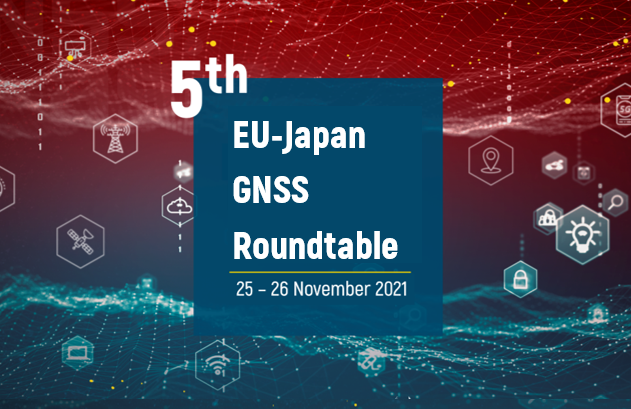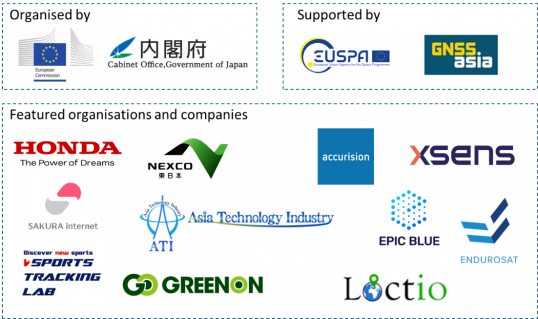
The EU and Japan are key actors and partners in the domain of space with rapidly evolving ecosystems. Moreover, the EU-Japan Strategic and Economic Partnership Agreements foresee close industrial cooperation.
Organised by the European Commission and the Cabinet Office, Government of Japan, the 5th edition of the EU-Japan GNSS Roundtable aspires to enhance the public-private dialogue, promote business cooperation and bring together established as well as new industry actors. Join the European Commission, the Japan Cabinet Office and representatives of the private sector in the EU and Japan to discuss how to make the most of our evolving GNSS assets to boost industrial cooperation and technological innovation, and to deliver jointly on the Sustainable Development Goals and the climate objectives. The Roundtable is supported by the European Union Agency for the Space Programme (EUSPA) and GNSS.asia (Horizon2020 EU funded project).
Register for the 5th EU-Japan GNSS Roundtable on 25 to 26 November 2021: https://hub.gnss.asia/
You can expect to learn about the latest system developments and market trends as well as exciting keynotes and panel discussions on GNSS for automotive unmanned mobility, emergency response and innovative services for ICT, Industry 4.0 and IoT amongst others. In addition, more than 10 companies from Europe and Japan will present how they create innovative solutions using GNSS.
Moreover, you will have the opportunity to engage in networking by joining digital get-togethers and build new business collaboration partnerships.
For up-to-date agenda, as well as registration and additional information, please use the link above.
Michibiki and Japan’s striving GNSS ecosystem
Japan’s Quasi-Zenith Satellite System (QZSS or Michibiki), operational as a four-satellite constellation from November 2018, contributes to strengthening industrial competitiveness and to modernising and effectuating operations of industries, lifestyle and administration of public organisations. In addition, QZSS is targeted at improving disaster management as Japan is particularly prone to a variety of natural disasters.
QZS-1R, which is a replacement satellite for QZS-1, was launched successufully on 26th Oct 2021. Three more satellites will be launched by March 2024, which leads to realise the seven-satellite constellation system.
QZS-3 is located in Geostationary orbit at 127 East and embarks Japanese SBAS payload. QZS-3 provides SBAS messages from 2020 under the name of Michibiki Satellite-based Argumentation Service (MSAS). Currently Japanese SBAS capability is APV and enroute/approach use. In the future, it is aming for LPV service under the seven-satellite constellation system.
Since QZSS started offering services in 2018, the PNT market in Japan is expanding its business areas including autonomous mobility, agriculture, land survey, sports, location-based service and so on, along with the increase in utilisation and application of QZSS services. In addition, smaller and less expensive receivers for QZSS high accuracy service are under development, and it is expected to further enlarge the market.
QZSS will enhance its high-precision reinforcement services for overseas especially in the Asia-Oceania region. So far, correction information for Precise Point Positioning (PPP) has been distributed as demonstration experiments. From 2024, QZSS will start practical operation of wide-area high accuracy augmentation service over the Asia-Oceania region generated by Multi-GNSS ADvanced Orbit and Clock Augmentation (MADOCA).
In addition, the Japanese EWS, which is called Satellite Report for Disaster and Crisis Management, is planned to expand its service coverage towards Asia-Oceania region from 2024. The government of Japan and the EU are currently discussing the possible common EWS message format to enhance the harmonisation of services.
QZSS is recognised as one of the World Wide Radio Navigation System (WWRNS), which was accepted at IMO 104 in 8th Oct. 2021. For vessel operation, QZSS can improve maritime navigation aide under its service coverage. QZSS has become the only GNSS system in the world that could be utilised in offshore area.
Galileo, its potential and the EU’s evolving Space Programme
Galileo and EGNOS are the two European satellite navigation programmes. Galileo provides navigation, positioning and timing information globally. EGNOS improves the performance of satellite navigation systems in Europe. Galileo is a key element of a broader established EU Space infrastructure with the second generation of Galileo satellites underway in upcoming years. To quote Thierry Breton, the EU Commissioner in charge of space matters, "Galileo will operate real technological breakthroughs with high innovative satellites and technologies such as digitally configurable antennas, inter- satellites links, new atomic clocks technologies or full electric propulsion systems. The Second Generation of Galileo will have significantly improved services capabilities, notably in the field of secured navigation and resilience against emerging threats”[1].
Galileo is a European success story. More than 2.3 billion Galileo-enabled mobile phones have been sold globally up to date. Moreover, of the 1.7 billion GNSS shipped units in 2019, more than 40% were Galileo-enabled [2]. While European independence is a principal objective of the programme, Galileo is designed to be compatible with all existing and planned GNSS and interoperable with GPS. In this sense, Galileo is positioned to enhance the coverage currently available – providing a more seamless and accurate experience for multi-constellation users around the world. Galileo’s services already make transport safer and more efficient and boost innovation contributing to the creation of many new products and services. Critical, emergency response-services benefit from Galileo as well.
These opportunities for the development of services using navigation satellite signals are considered instrumental to the green and digital transition and eagerly seized by start-ups and SMEs, which create a wide variety of applications for the growing global app community. Some of them will present their solutions at the EU-Japan GNSS Roundtable.
Organisers and Supporters of the EU-Japan GNSS Roundtable
Organised by the European Commission
The Directorate-General for Defence Industry and Space (DEFIS) leads the European Commission's activities in the Defence Industry and Space sector. In the area of Space, DG DEFIS is in charge of implementing the EU Space programme comprising the GNSS flagships Galileo and EGNOS, as well as Copernicus, for Earth observation, and the establishment of new components. DG DEFIS international cooperation in space matters is an essential part of ensuring the proper functioning of the Union Space Programme, enabling the global uptake of EU space services and data, opening or expanding international markets for the EU aerospace industrial ecosystem, and projecting EU values on the global stage.
Organised by the Cabinet Office, Government of Japan
The Cabinet Office is in charge of planning, designing, coordinating and implementing policies concerning space exploitation. In accordance with the Basic Space Law, the Strategic Headquarters for National Space Policy (National Space Policy Secretariat, NSPS) was established to comprehensively and systematically promote policies related to space development and utilisation. Besides, NSPS is also in charge of the development and operation of the Quasi-Zenith Satellite System (QZSS).
Supported by EUSPA
The European Union Agency for the Space Programme (EUSPA) is linking space to user needs. EUSPA’s core mission is to implement the EU Space Programme and to provide reliable, safe and secure space-related services. By fostering the development of innovative and competitive upstream and downstream sectors, EUSPA is driving innovation-based growth in the global economy and is contributing to the safety of EU citizens and the security of the Union and its Member States.
Supported by GNSS.asia
Via an assistance network of local representatives across Asia, supplemented with expert knowledge of local and wider technology trends, GNSS.asia has been driving industry collaboration on GNSS technology across continents for over a decade. The project has a significant outreach both in Asia-Pacific and in Europe. GNSS.asia is funded by the European Union within Horizon 2020, the EU Framework Programme for Research and Innovation, under grant agreement no 870296.
[1] https://ec.europa.eu/commission/commissioners/2019-2024/breton/announce…
[2] https://www.euspa.europa.eu/european-space/euspace-market
Organised by Supported by
Details
- Publication date
- 4 November 2021

